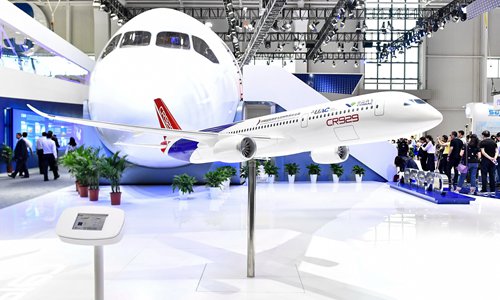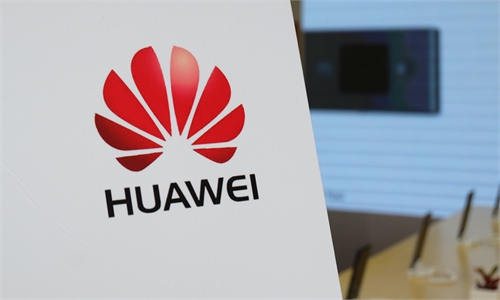SOURCE / INDUSTRIES
China, Russia eye closer partnership in technology innovations
China, Russia eye closer partnership in technology

A life-size model of CR929 is exhibited at the 12th China International Aviation and Aerospace Exhibition in Zhuhai, South China's Guangdong Province, on November 6 2018. Photo: VCG
Chinese President Xi Jinping and Russian President Vladimir Putin Wednesday respectively sent congratulatory letters to the opening of the Year of Scientific and Technological Innovation between the two countries, according to the Xinhua News Agency.
There is huge potential for the two countries to develop cooperation in the high-tech sector, and both should seize the opportunity of the year of innovation to give full play to their respective advantages and deepen their bilateral ties, experts say.
Increasing cooperation in the technology sector signals closer bilateral relations and the further development of the strategic partnership, Song Kui, president of the Contemporary China-Russia Regional Economy Research Institute, told the Global Times Wednesday.
For instance, talks about possible cooperation involving China's BeiDou Navigation Satellite System and Russia's GLONASS are in progress, according to Song.
Russia specializes in aviation and aerospace, engines, new materials, laser techniques and so on, while 5G telecommunications and artificial intelligence (AI) are burgeoning in China. The two countries have huge cooperation opportunities in these areas, he noted, adding that cooperation has surpassed the entry level with researchers visiting one another's leading institutes to explore breakthroughs in technology.
China and Russia agreed in September last year to strengthen cooperation in scientific and technological innovation, and the two countries designated the years of 2020 and 2021 as the "Year of Scientific and Technological Innovation" in each other's country.
Following such projects as China's COMAC C919 and Russia's UAC MC-21, the two countries have teamed up in the airliner sector to build the CR929, a wide-body aimed to rival the Boeing 787 and Airbus A330. The plane is believed to be one of the largest bilateral projects in the 21st century.
In the telecommunications sector, Russia is ready to cooperate with China and Huawei Technologies on 5G, which Moscow is trying to develop, local media outlet Interfax reported on Sunday, citing Russia's Foreign Minister Sergei Lavrov.
Huawei has been actively expanding in other markets like Russia amid a US ban. The Chinese tech giant has always attached importance to Russia's talent advantage in innovation, as Ren Zhengfei, founder of Huawei, has frequently mentioned an unidentified Russian mathematician who helped the company achieve a technical breakthrough from 2G to 3G.
Having accumulated rich experience in the mobile internet industry and emerging technologies such as AI and big data, Chinese high-tech startups are actively exploring overseas markets.
Didi Chuxing, the Chinese mobile transportation startup, announced Tuesday that it started offering its ride-hailing services in Russia, its first Eurasian market. "We welcome pro-innovation policies in Russia and we are committed to developing enduring collaboration with local partners and communities," DiDi told the Global Times on Wednesday.
The launch of DiDi Express was in Kazan, the capital and largest city of the Republic of Tatarstan, which is home to Russia's largest IT park and has one of the strongest pro-innovation development agendas in Russia.





